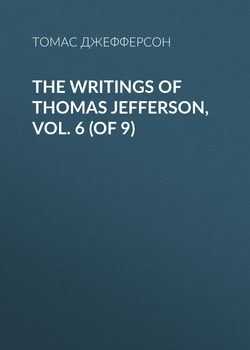Читать книгу The Writings of Thomas Jefferson, Vol. 6 (of 9) - Томас Джефферсон, Thomas Jefferson - Страница 71
PART III.—Continued.
LETTERS WRITTEN AFTER HIS RETURN TO THE U. S. DOWN TO THE TIME OF HIS DEATH.
1790-1826
TO MR. MATTHEW CARR
ОглавлениеMonticello, June 19, 1813.
Sir,—I thank you for the copy of Mr. Clarke's sketches of the naval history of the United States, which you have been so kind as to send me. It is a convenient repository of cases of that class, and has brought to my recollection a number of individual cases of the Revolutionary war which had escaped me. I received, also one of Mr. Clarke's circulars, asking supplementary communications for a second edition. But these things are so much out of the reach of my inland situation, that I am the least able of all men to contribute anything to his desire. I will indulge myself, therefore, in two or three observations, of which you will make what use you may think they merit. 1. Bushnel's Turtle is mentioned slightly. Would the description of the machine be too much for the sale of the work? It may be found very minutely given in the American Philosophical transactions. It was excellently contrived, and might perhaps, by improvement, be brought into real use. I do not know the difference between this and Mr. Fulton's submarine boat. But an effectual machine of that kind is not beyond the laws of nature; and whatever is within these, is not to be despaired of. It would be to the United States the consummation of their safety. 2. The account of the loss of the Philadelphia, does not give a fair impression of the transaction. The proofs may be seen among the records of the Navy office. After this loss, Capt. Bainbridge had a character to redeem. He has done it most honorably, and no one is more gratified by it than myself. But still the transaction ought to be correctly stated. 3. But why omit all mention of the scandalous campaigns of Commodore Morris? A two years' command of an effective squadron, with discretionary instructions, wasted in sailing from port to port of the Mediterranean, and a single half day before the port of the enemy against which he was sent. All this can be seen in the proceedings of the court on which he was dismissed; and it is due to the honorable truths with which the book abounds, to publish those which are not so. A fair and honest narrative of the bad, is a voucher for the truth of the good. In this way the old Congress set an example to the world, for which the world amply repaid them, by giving unlimited credit to whatever was stamped with the name of Charles Thompson. It is known that this was never put to an untruth but once, and that where Congress was misled by the credulity of their General (Sullivan). The first misfortune of the Revolutionary war, induced a motion to suppress or garble the account of it. It was rejected with indignation. The whole truth was given in all its details, and there never was another attempt in that body to disguise it. These observations are meant for the good of the work, and for the honor of those whom it means to honor. Accept the assurance of my esteem and respect.
